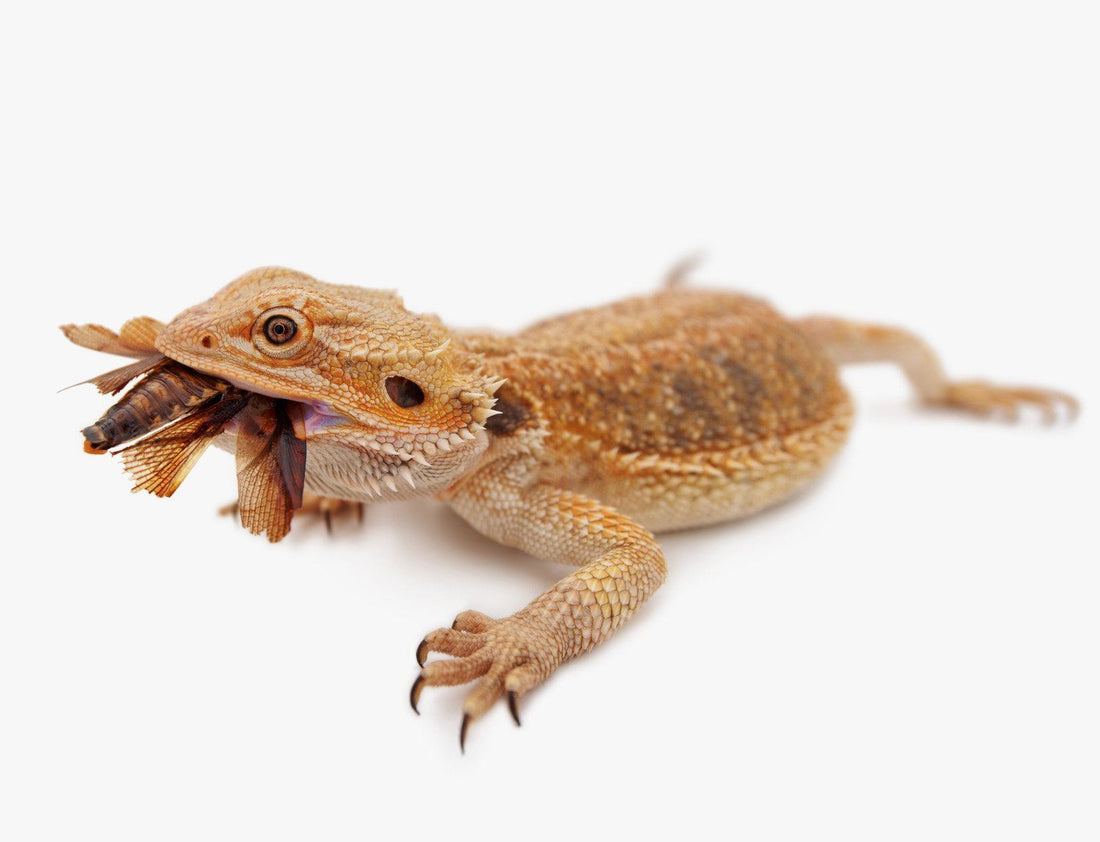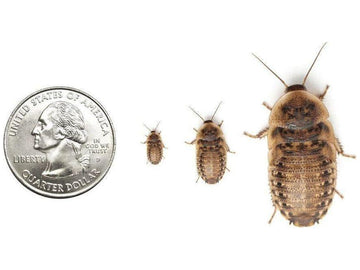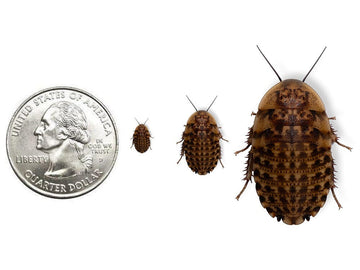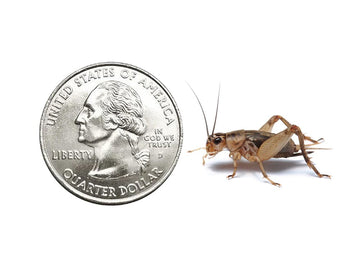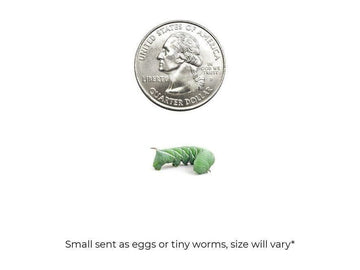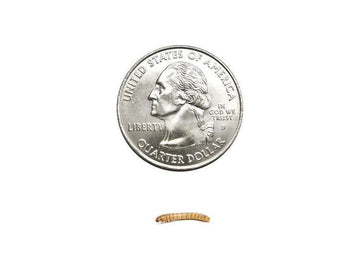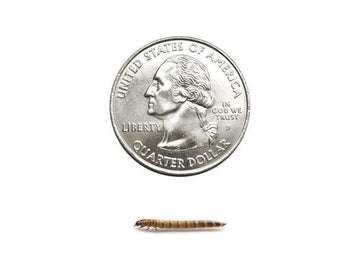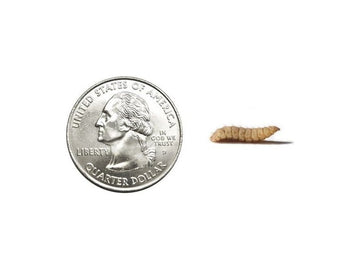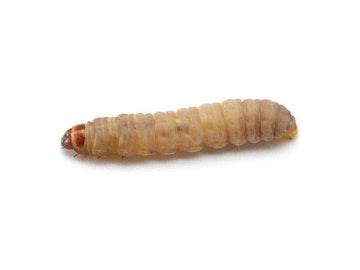Dubias are commonly praised for their higher protein content compared to crickets, and this fact is often used by dubia breeders in advertising. But could all of this protein actually be a bad thing? With a surge of concerns cropping up across the internet about gout cases being connected to the routine use of dubias as feeders, it’s time to have some real talk.
Dubias Compared to Other Feeders
Recently I came across a social media post arguing that because dubias are 36% protein, they’re the worst feeder insect you can use, and are likely to give pet reptiles gout. I found that claim interesting, because when I sent several different sizes of Dubia.com’s dubias to a lab for independent nutritional composition analysis, these are the results I got back:
|
Size |
Moisture (%) |
Protein (%) |
Fat (%) |
Ash (%) |
Fiber (%) |
Calcium (mg/kg) |
Phosphorus (mg/kg) |
|
Extra Small |
71.5 |
21.4 |
6.1 |
1.3 |
2.6 |
700 |
2600 |
|
Medium |
70.8 |
19.6 |
6.7 |
1.2 |
2.9 |
700 |
2600 |
|
Extra Large |
65.6 |
23.4 |
7.2 |
1.2 |
2.9 |
800 |
2600 |
(Photocopies of the test results can be viewed here.)
These numbers are on an as-fed basis, and as you can tell, none of the three nymph sizes we tested have a protein content anywhere close to the 36% being claimed.
Now let’s compare dubias to other popular feeder insects for reptiles and amphibians:
|
Species |
Moisture (%) |
Protein (%) |
Fat (%) |
Ash (%) |
Fiber (%) |
Calcium (mg/kg) |
Phosphorus (mg/kg) |
|
Dubias |
65.6 |
23.4 |
7.2 |
1.2 |
2.9 |
800 |
2600 |
|
Crickets |
77.1 |
15.4 |
3.3 |
1.1 |
2.2 |
275 |
2520 |
|
NutriGrubs |
61.2 |
17.5 |
14 |
3.5 |
3 |
9340 |
3560 |
|
Hornworms |
85 |
9 |
3.07 |
n/a |
n/a |
464 |
1394 |
|
Superworms |
57.9 |
19.7 |
17.7 |
1.0 |
2.7 |
177 |
2370 |
|
Mealworms |
61.9 |
18.7 |
13.4 |
0.9 |
2.5 |
169 |
2950 |
|
Waxworms |
58.5 |
14.1 |
24.9 |
0.6 |
3.4 |
243 |
1950 |
|
Silkworms |
82.7 |
9.3 |
1.1 |
1.1 |
1.1 |
177 |
2370 |
|
Butterworms |
60.2 |
15.5 |
29.4 |
0.8 |
1.4 |
125 |
2250 |
|
Fruit Flies |
69.1 |
21.0 |
5.9 |
3.1 |
2.2 |
526 |
4080 |
Yes, dubias are pretty high in protein. But so are fruit flies, superworms, and mealworms — all of which are just as popular for feeding to reptiles, if not more so! Plus, most edible insects have a high enough purine content that they’re not recommended for humans with gout to eat, and yet they’re a major dietary component for many lizards.
If high protein and/or purine content is really the issue, then why aren’t we seeing more problems?
How to Feed Your Dubias Properly
If our independent testing revealed an as-fed dubia protein content of 23.4% or less, then where did the 36% number come from? Most likely, that incredibly high number came from dubias that were fed a high-protein diet. As the saying goes, “you are what you eat,” and this applies to gutloading feeder insects — especially dubias.
Dubias and other types of cockroaches have evolved to survive on an extremely low-protein diet, so their bodies are very good at getting every last bit of protein from what they eat in the wild, and they store that protein in their bodies in the form of uric acid to help increase their ability to reproduce successfully. While this works great as a survival strategy for wild dubias, this can quickly become a problem for them in captivity, where they enjoy a much richer diet.
Whether you’re trying to gutload dubias, or breeding your own, you may be tempted to feed them as cheaply as possible, using bulk foods like dog/cat kibble, fish flakes, chicken feed, or chicken feed re-labeled as dubia food. Many dubia breeders and pet stores take the same approach. This seems to work at first, but there’s a hidden cost: because of their high-protein diet, these dubias will be packed with uric acid, which is the same protein byproduct known to cause gout in high enough quantities.
So what ARE you supposed to feed dubias? The answer is a low-protein, plant-based diet. Dubia.com raises its feeders on an entirely plant-based, low-protein diet (~17% dry matter basis). The result is dubias that are healthy, optimally nutritious, and safe for reptiles to eat. We have fed our own insectivorous reptiles with dubias as their primary feeder, and have experienced no diet-related health problems.
You can use nutritious fruits and vegetables like leafy greens, bananas, carrots, apples, potatoes, etc., which is definitely nice and cheap. But if you only use these, there’s a chance that your dubias won't be as nutritious as they could be. Therefore, it’s ideal to use a high-quality powdered or gel-based diet specifically formulated for safely and effectively gut-loading feeder insects, or with a similar composition. Examples include:
- Dubia.com Dubia Diet
- Arcadia InsectFuel
- Repashy Bug Burger
- Repashy Grassland Grazer
When in doubt, look for a high-quality, plant-based diet that has a protein content of less than 20% and avoids the use of grain bran. Generally speaking, cricket diets are not appropriate to feed to dubias. Also avoid any diets that contain casein, as casein produces more uric acid than other proteins.
How to Avoid Excess Protein in Your Pet’s Diet
How worried should you be about protein and uric acid? Generally speaking, you shouldn’t have to worry about them at all. A healthy, well-hydrated reptile should be able to eliminate all excess uric acid from its system with no complications. It’s only when the animal isn’t healthy that uric acid can become a concern.
Of course, it’s still best practice to be careful.
Aside from gutloading your feeders mindfully, make sure to offer a wide variety of different feeder insects, alternating between high-protein feeders and lower-protein feeders.
- High-protein feeder insects:
- Dubias
- Discoids
- Superworms
- Mealworms
- Snails
- Grasshoppers
- Locusts
- Fruit flies
- Lower-protein feeder insects:
- Crickets
- Black soldier fly larvae (Nutrigrubs)
- Silkworms
- Rice worms
- American cockroaches
- Hornworms
- Red runners
- Earthworms
- Giant mealworms
It’s also good practice to avoid feeding adult roaches to your reptile whenever possible, as these store the most protein (particularly females). Nymphs make the best feeders!
However, the most important thing you should be doing is making sure that your pet reptile is appropriately hydrated!! Water is crucial to helping reptiles’ organs function properly and enabling them to safely eliminate excess uric acid. Even if you have a “desert”-type reptile like a bearded dragon or leopard gecko, you still need to provide a humid hideout and a bowl of fresh water at all times (no, this will not raise local humidity to dangerous levels). Also avoid feeding dry foods like pellets, dehydrated insects, or dehydrated fruits/vegetables. Soaking is not an effective method of keeping your reptile hydrated.
Conclusion
Due to the popularity of dubias as feeders, there are a lot of reptiles currently being maintained on dubia-heavy diets. To give you an idea, Dubia.com currently sells 6-8 million dubia per month, with roughly 40,000 animals getting dubia on a regular basis over the course of recent years. And yet, there are relatively few cases of gout being reported. If dubias were dangerously high in protein, the incidence of gout diagnoses would be much higher.
However, there are cases out there, likely compounded by issues with dehydration and other factors. Genetics can also play a role, which is usually the result of buying from low-quality breeders and pet stores. The best way to keep your reptile healthy and reduce the risk of diet-related illness is to use a variety of different foods, gutload your feeders carefully, and keep your pet well-hydrated.
References
Dubia roaches and dietary protein: How much is enough? (2014, July 3). Dubia Roach Depot. https://dubiaroachdepot.com/guidance/dubia-roaches-dietary-protein
Healey, M. (2017, November 18). Feeder Insect Nutrition Facts for Reptile Keepers. ReptiFiles. https://reptifiles.com/feeder-insect-nutrition-facts-chart/
Repashy, A. (n.d.). Can Feeder Insect Diets Contribute To Gout In Reptiles? Repashy Ventures. Retrieved December 15, 2021, from https://www.store.repashy.com/can-feeder-insect-diets-contribute-to-gout-in-reptiles.html

